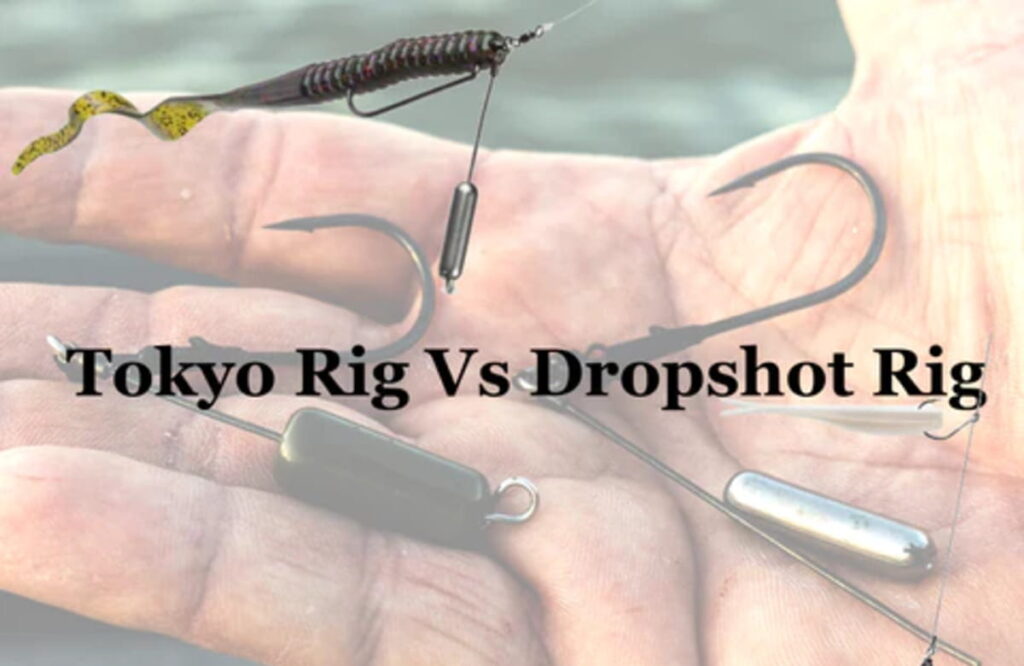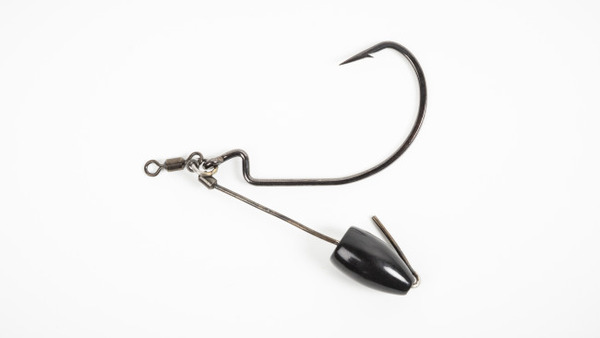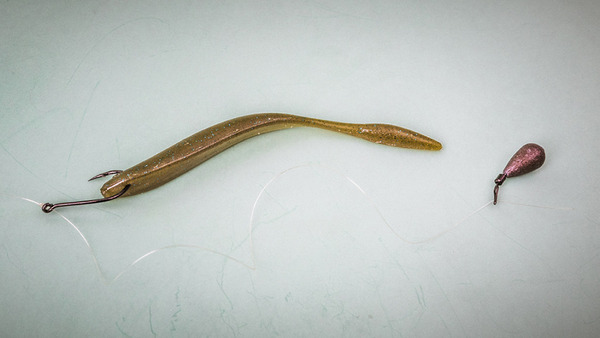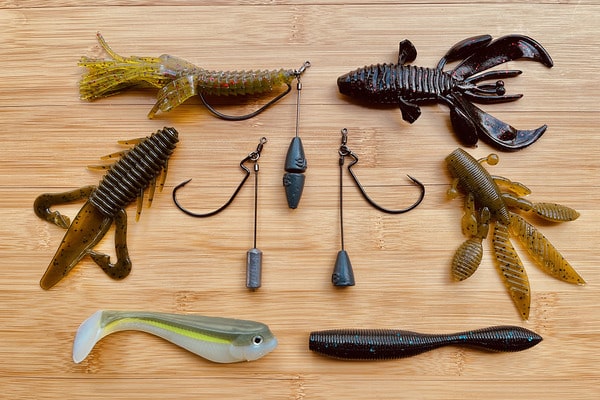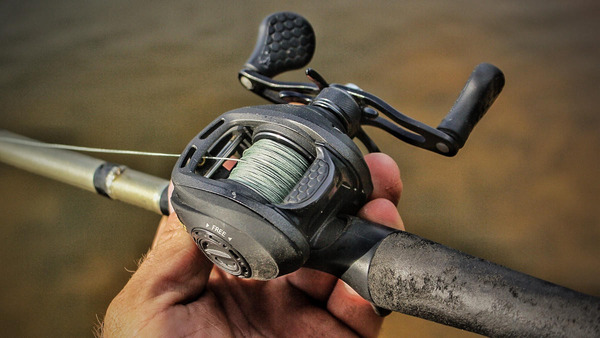Tokyo Rig vs Drop Shot Rig for Bass Fishing
While these two rigs look very similar, they differ significantly in design, application, and the type of fishing scenarios they excel in.
Understanding these differences is crucial for anglers looking to optimize their fishing strategies based on water conditions, fish behavior, and personal preferences.
Let’s take a detailed look at the Tokyo rig vs the drop shot rig.
Tokyo Rig and Drop Shot Design Differences
Tokyo Rig
The Tokyo rig is constructed around a thick, EWG style hook.
A barrel swivel and a hanging wire are both attached to this hook using a split ring.
Then, a bullet or football sinker is added to the bottom of the hanging wire.
It sounds a bit complicated, but it is actually quite simple once you get it in your hands.
Drop Shot
The drop shot rig is built around either a finesse hook or a light wire worm hook.
The line is tied to to the hook as you normally would, except that you leave the tag end very long.
This tag end is where you add the bell sinker or drop shot weight.
There are also specialized drop shot hooks, but I actually prefer using the tag end method.
Power vs Finesse Fishing
Tokyo Rig
Fishing the Tokyo rig is much more of a power fishing technique.
The weight is a bit heavier and you are using a much bigger, heavier wire hook.
This sets the rig up to be fished faster and more aggressively.
Punching is one of the most popular ways to fish the Tokyo rig, and it doesn’t get more power fishing than punching thick mats.
Drop Shot
Now the drop shot is going to be an ultra finesse presentation.
Light, fluorocarbon line, a light hook, and small, finesse, soft plastic baits.
The drop shot is one of those baits that get bass to bite even when they are finicky or maybe aren’t even hungry.
When to Use the Tokyo Rig
The Tokyo rig excels in warm or warming water. This means that during the spring or summer months, the Tokyo rig can work very well.
Because the rig’s compact and strong design, it can be fished in and around the thickest cover.
During the warm months, bass love to hold very closely to shallow brush piles and grass.
The Tokyo rig also works a bit better in stained to muddy water. The simple reason for this is that there is a thick wire and giant weight hanging from the bait.
This is obviously not the most realistic profile, so it helps to have a bit of color in the water to reduce the bait’s visibility.
To recap, use a Tokyo rig in warm or warming water and around cover. There is one exception to this.
Sometimes, I will slow roll a Tokyo rigged swimbait on the bottom during the pre-spawn or early winter periods. But for the most part, those rules are true.
When to Use the Drop Shot Rig
The drop shot is a finesse setup. This means that it can really work all year round.
But it outperforms other baits when the water is cold or the bass are inactive.
Pretty much all throughout the winter, a drop shot is going to be a great option.
But even in the spring, summer, and fall, bass get in moods and become inactive.
When this happens, a finesse approach is usually the way to go. Especially in clear water, the drop shot is hard to beat.
It allows you to suspend an enticing soft plastic bait right in front of the bass and just wiggle it around.
So drop shots work best in cold water, pressured water, for finicky bass, and in clear water.
This is a lot of situations, but the drop shot is an incredible setup, so it’s to be expected.
Best Soft Plastics for Tokyo Rig
The best soft plastic baits for a Tokyo rig are going to be creature baits and paddle tail swimbaits.
You want baits that give off lots of action, vibration, and have a large presence in the water.
Again, it is a power fishing rig. So you want to get the bass riled up and attacking your bait. Large flapping appendages, claws, or tails are ideal.
Best Soft Plastics for Drop Shot
It is best to pair a drop shot rig with small, thin, worm or minnow style baits.
These baits don’t have much action to them, but that is why they work so well.
When bass are now in an aggressive mood, they don’t want to be bothered with obnoxious flapping baits or large profiles.
They just want a small, harmless, easy snack that is hovering right in front of them.
The best drop shot baits for smallmouth bass and largemouth bass are essentially the same.
Gear for Tokyo Rig vs Drop Shot Rig
Tokyo Rig
You are going to need a baitcasting setup.
A standard 7′, medium-heavy, fast action rod will do just fine.
When it comes to line, I like a 40-50 lb braid with a 20 lb fluorocarbon leader.
This is pretty heavy line, but you need to be able to get a strong hook set and pull the bass out of vegetaton.
Drop Shot
A spinning rod and reel are certainly the best.
I like a 6’10” OR 7′ medium action spinning rod.
The line is rather important when fishing a drop shot.
You want to us as light line as you can get away with.
8-10 lb fluorocarbon is ideal in order to reduce visibility in clear water.
Tokyo Rig Underwater
https://barbcatchfishing.com/wp-content/uploads/2024/03/LRYU12911.mov
Drop Shot Rig Underwater
https://barbcatchfishing.com/wp-content/uploads/2024/03/LFWK89521.mov
Reeling this In
In conclusion, the Tokyo Rig and Drop Shot Rig represent two distinct approaches to bass fishing, each with its own set of advantages and ideal fishing scenarios.
The Tokyo Rig is a powerhouse setup, designed for aggressive, power fishing tactics in warmer waters and dense cover.
On the other hand, the Drop Shot Rig shines as a finesse presentation, perfect for targeting finicky or inactive bass in cold, clear, or pressured water conditions.
Ultimately, both rigs have their place in an angler’s arsenal, offering versatility and effectiveness across different seasons and water types.

